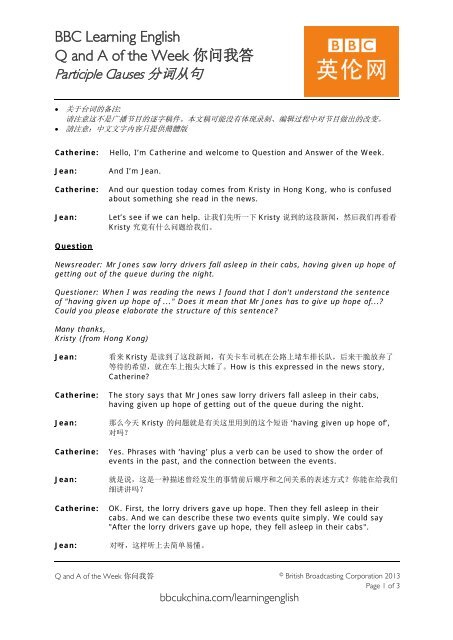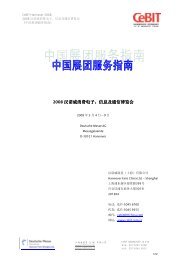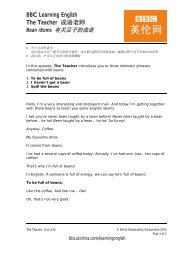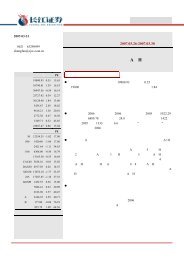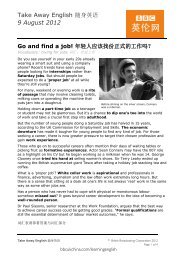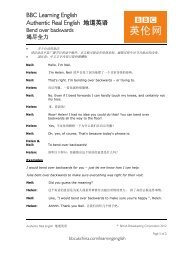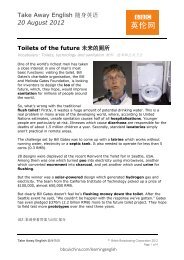BBC Learning English
BBC Learning English
BBC Learning English
You also want an ePaper? Increase the reach of your titles
YUMPU automatically turns print PDFs into web optimized ePapers that Google loves.
<strong>BBC</strong> <strong>Learning</strong> <strong>English</strong><br />
Q and A of the Week 你 问 我 答<br />
Participle Clauses 分 词 从 句<br />
• 关 于 台 词 的 备 注 :<br />
请 注 意 这 不 是 广 播 节 目 的 逐 字 稿 件 。 本 文 稿 可 能 没 有 体 现 录 制 、 编 辑 过 程 中 对 节 目 做 出 的 改 变 。<br />
• 請 注 意 : 中 文 文 字 内 容 只 提 供 簡 體 版<br />
Catherine:<br />
Jean:<br />
Catherine:<br />
Jean:<br />
Hello, I’m Catherine and welcome to Question and Answer of the Week.<br />
And I’m Jean.<br />
And our question today comes from Kristy in Hong Kong, who is confused<br />
about something she read in the news.<br />
Let’s see if we can help. 让 我 们 先 听 一 下 Kristy 说 到 的 这 段 新 闻 , 然 后 我 们 再 看 看<br />
Kristy 究 竟 有 什 么 问 题 给 我 们 。<br />
Question<br />
Newsreader: Mr Jones saw lorry drivers fall asleep in their cabs, having given up hope of<br />
getting out of the queue during the night.<br />
Questioner: When I was reading the news I found that I don't understand the sentence<br />
of "having given up hope of ..." Does it mean that Mr Jones has to give up hope of...?<br />
Could you please elaborate the structure of this sentence?<br />
Many thanks,<br />
Kristy (from Hong Kong)<br />
Jean:<br />
Catherine:<br />
Jean:<br />
Catherine:<br />
Jean:<br />
Catherine:<br />
看 来 Kristy 是 读 到 了 这 段 新 闻 , 有 关 卡 车 司 机 在 公 路 上 堵 车 排 长 队 , 后 来 干 脆 放 弃 了<br />
等 待 的 希 望 , 就 在 车 上 抱 头 大 睡 了 。How is this expressed in the news story,<br />
Catherine?<br />
The story says that Mr Jones saw lorry drivers fall asleep in their cabs,<br />
having given up hope of getting out of the queue during the night.<br />
那 么 今 天 Kristy 的 问 题 就 是 有 关 这 里 用 到 的 这 个 短 语 ‘having given up hope of’,<br />
对 吗 ?<br />
Yes. Phrases with ‘having’ plus a verb can be used to show the order of<br />
events in the past, and the connection between the events.<br />
就 是 说 , 这 是 一 种 描 述 曾 经 发 生 的 事 情 前 后 顺 序 和 之 间 关 系 的 表 述 方 式 ? 你 能 在 给 我 们<br />
细 讲 讲 吗 ?<br />
OK. First, the lorry drivers gave up hope. Then they fell asleep in their<br />
cabs. And we can describe these two events quite simply. We could say<br />
"After the lorry drivers gave up hope, they fell asleep in their cabs".<br />
Jean: 对 呀 , 这 样 听 上 去 简 单 易 懂 。<br />
Q and A of the Week 你 问 我 答 ©British Broadcasting Corporation 2013<br />
Page 1 of 3<br />
bbcukchina.com/learningenglish
Catherine:<br />
Jean:<br />
Catherine:<br />
Jean:<br />
Catherine:<br />
Jean:<br />
Catherine:<br />
Jean:<br />
Catherine:<br />
Jean:<br />
Catherine:<br />
Yes it is. Simple cause and effect.<br />
对 , 原 因 和 结 果 非 常 清 楚 – 头 一 件 发 生 的 事 情 导 致 了 后 一 件 事 情 的 发 生 。 不 过 说 一 直<br />
排 长 队 到 后 来 放 弃 了 希 望 的 人 应 该 更 像 是 Mr Jones, 你 说 呢 ?<br />
That’s possible, yes. It could be about him.<br />
不 过 这 段 新 闻 里 的 重 点 还 是 放 在 了 排 队 等 的 不 耐 烦 而 在 车 里 睡 觉 的 卡 车 司 机 们 。 所 以 这<br />
样 推 理 来 看 , 应 该 是 卡 车 司 机 们 放 弃 了 等 候 的 希 望 , 这 也 是 他 们 转 而 在 车 里 睡 觉 的 原 因<br />
吧 。<br />
Exactly. And if you want to use more advanced <strong>English</strong> to express this<br />
simple cause and effect relationship…<br />
… 就 可 以 用 动 词 短 语 ‘give up hope’.<br />
Right, and you make it into a phrase, starting with ‘having’. Having given<br />
up hope, the lorry drivers fell asleep in their cabs. It means: first they<br />
gave up hope and then they fell asleep.<br />
Having given up hope, the lorry drivers fell asleep in their cabs. 你 在 说 这 句<br />
话 的 时 候 , 用 的 是 given 过 去 分 词 的 形 式 , 而 不 是 用 的 give 或 者 gave.<br />
Yes. It’s ‘having’ plus a past participle. Having given, having taken, having<br />
seen. You’re making participle clauses.<br />
‘Having’ 后 面 跟 动 词 的 过 去 分 词 形 式 。 知 道 了 ! 而 且 这 样 一 来 , 前 因 后 果 这 两 句 话 也<br />
可 以 前 后 替 换 着 说 , 意 思 也 是 不 变 的 。<br />
Yes. Having given up hope, the lorry drivers fell asleep. Or: the lorry<br />
drivers fell asleep, having given up hope.<br />
Jean: 不 过 在 这 段 新 闻 原 文 里 , 另 一 个 动 词 fall 为 什 么 是 以 原 形 出 现 而 不 是 过 去 时 呢 ?<br />
Catherine:<br />
Jean:<br />
Catherine:<br />
That’s because Mr Jones saw them. Mr Jones saw them fall asleep.<br />
就 是 说 当 时 是 ‘Mr Jones saw’ 琼 斯 先 生 看 到 他 们 正 在 做 什 么 , 已 经 表 述 出 了 过 去 时<br />
了 。 懂 了 !<br />
I’m glad you’ve got it Jean, because now we’re going to do some practice.<br />
Jean: 哦 惨 了 , 还 要 练 习 。 我 们 怎 么 练 呢 ?<br />
Catherine:<br />
Jean:<br />
Catherine:<br />
I’m going to give you two sentences, and you have to join them together<br />
using a participle clause – having with a past participle.<br />
要 我 把 两 个 句 子 连 在 一 起 , 运 用 今 天 学 到 的 这 样 的 表 述 架 构 。 没 问 题 ,Let’s go!<br />
OK. Here’s the first one. I took the wrong train. I was late for work.<br />
Q and A of the Week 你 问 我 答 ©British Broadcasting Corporation 2013<br />
Page 2 of 3<br />
bbcukchina.com/learningenglish
Jean:<br />
Catherine:<br />
Jean:<br />
Catherine:<br />
Jean:<br />
Catherine:<br />
我 搭 错 了 车 。 我 上 班 迟 到 。I took the wrong train. I was late for work. 那 应 该<br />
说 … Having taken the wrong train, I was late for work. Is that right?<br />
It’s perfect! Having taken the wrong train, I was late for work.<br />
我 搭 错 了 车 , 所 以 上 班 迟 到 了 。Another one please?<br />
OK another one. David ate a huge meal. Then he slept for three hours.<br />
David ate a huge meal. Then he slept for three hours. Having eaten a huge<br />
meal, David slept for three hours.<br />
Excellent! Having eaten a huge meal, David slept for three hours.<br />
Jean: 大 卫 饱 餐 一 顿 , 结 果 大 睡 三 小 时 。 看 来 肯 定 是 撑 着 了 !<br />
Catherine:<br />
Jean:<br />
Catherine:<br />
And we can swap the parts of the sentence round to say:<br />
David slept for three hours, having eaten a huge meal.<br />
Excellent. One more, Jean?<br />
Jean: 没 问 题 呀 , 再 来 !<br />
Catherine:<br />
Jean:<br />
Catherine:<br />
Jean:<br />
Catherine:<br />
OK. William finished university, and he decided to go travelling.<br />
Having finished university, William decided to go travelling. 或 者 也 可 以 这 样<br />
说 William decided to go travelling, having finished university.<br />
Both perfect. Absolutely perfect!<br />
谢 谢 Catherine. 看 来 , 我 们 可 以 用 加 having 的 分 词 从 句 来 表 述 发 生 在 过 去 的 两 件<br />
事 。<br />
Yes, especially when there is a cause and effect relationship between the<br />
two events.<br />
Jean: 尤 其 是 这 两 件 事 在 有 因 果 关 系 的 时 候 。<br />
Catherine:<br />
So, having answered Kristy’s question, we’ve come to the end of the<br />
programme.<br />
Jean: 又 用 了 一 次 Catherine. Kristy, 也 希 望 我 们 今 天 的 节 目 内 容 为 你 的 问 题 提 供 了 答 案 。<br />
各 位 朋 友 如 果 有 英 语 学 习 方 面 的 问 题 , 也 可 以 给 我 们 邮 件 提 出 , 我 们 的 邮 箱 地 址 是<br />
questions.chinaelt@bbc.co.uk. 各 位 朋 友 再 见 !<br />
Catherine:<br />
Goodbye!<br />
Q and A of the Week 你 问 我 答 ©British Broadcasting Corporation 2013<br />
Page 3 of 3<br />
bbcukchina.com/learningenglish


